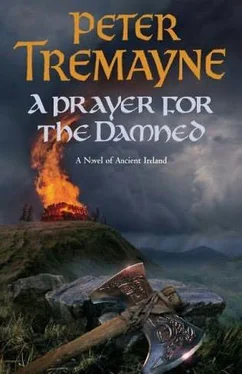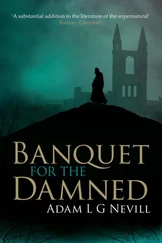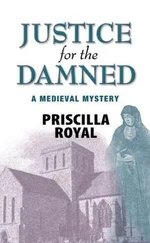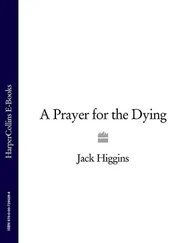Peter Tremayne - A Prayer for the Damned
Здесь есть возможность читать онлайн «Peter Tremayne - A Prayer for the Damned» весь текст электронной книги совершенно бесплатно (целиком полную версию без сокращений). В некоторых случаях можно слушать аудио, скачать через торрент в формате fb2 и присутствует краткое содержание. Жанр: Исторический детектив, на английском языке. Описание произведения, (предисловие) а так же отзывы посетителей доступны на портале библиотеки ЛибКат.
- Название:A Prayer for the Damned
- Автор:
- Жанр:
- Год:неизвестен
- ISBN:нет данных
- Рейтинг книги:4 / 5. Голосов: 1
-
Избранное:Добавить в избранное
- Отзывы:
-
Ваша оценка:
- 80
- 1
- 2
- 3
- 4
- 5
A Prayer for the Damned: краткое содержание, описание и аннотация
Предлагаем к чтению аннотацию, описание, краткое содержание или предисловие (зависит от того, что написал сам автор книги «A Prayer for the Damned»). Если вы не нашли необходимую информацию о книге — напишите в комментариях, мы постараемся отыскать её.
A Prayer for the Damned — читать онлайн бесплатно полную книгу (весь текст) целиком
Ниже представлен текст книги, разбитый по страницам. Система сохранения места последней прочитанной страницы, позволяет с удобством читать онлайн бесплатно книгу «A Prayer for the Damned», без необходимости каждый раз заново искать на чём Вы остановились. Поставьте закладку, и сможете в любой момент перейти на страницу, на которой закончили чтение.
Интервал:
Закладка:
‘So can you be more specific as to why you disliked Ultán?’
The northern noble grimaced. ‘Indeed I can. Perhaps I should start with a story told me by my father, who was Bressal, brother of Máel Coba, who was then king of Ulaidh. He knew of Ultán when he was a young man, Ultán was a wild, profane and wayward youth.’
Fidelma’s brow rose slightly. ‘This same Abbot Ultán who was emissary of the Comarb of Patrick at Ard Macha?’ Her voice was slightly sceptical.
‘The very same. In his younger days he was a godless man. He was a thief and murderer, a dissolute and a womaniser.’
‘It is hard to believe,’ said Eadulf. ‘I thought he was one of the great reformers of the church — one who welcomes the strict rules of Rome.’
‘I will tell you the story,’ Fergus Fanat went on. ‘In his youth, Ultán was named Uallgarg, the proud and fierce. That’s what he was. He cared nothing for anyone and answered to no authority. He was caught several times by the king’s bodyguard and brought before the brehons for judgement. He refused their justice and went on his way as before. Then he fell in with a beautiful young girl whom he debauched. He shamed her by making her pregnant and then abandoning her.’
‘You are repeating the story told you by your father,’ Fidelma pointed out. ‘In law this is inadmissible. How do you know that this was a true account?’
Fergus Fanat glanced at her for a moment and then grimaced sadly.
‘The girl in question was my aunt,’ he said softly. ‘Her child was stillborn and she never recovered. Her mind fled her body and she lived in a world of her own — I remember her. I was fifteen summers old. She became a simpleton and died before her time.’ He sighed deeply. ‘To be truthful, I let out a shout of joy when I heard that someone had killed Ultán. My only regret was that it was not I.’
CHAPTER TEN
Fidelma and Eadulf both paused in mid-stride at the quiet vehemence in the young man’s voice. Then they resumed their pacing alongside him.
‘In view of what you have just said,’ Fidelma said quietly, ‘perhaps, before we continue further, it might be best to tell us what you were doing when Ultán was killed last night.’
Fergus Fanat was not offended. In fact, he gave a deep chuckle.
‘If I had any sense I would have been in bed, for I am told it was around midnight that Ultán was killed in his chamber: However, I confess that I was drinking with some comrades of mine who serve in the Fianna of the High King.’
The Fianna were the High King’s élite bodyguards, just as the kings of Cashel boasted their élite warriors, the Nasc Niadh. Each king of a cóicead , one of the five kingdoms, had his warrior élite.
‘And these comrades can vouch for that?’
The dark-haired man grinned at her. ‘If any were sober enough to remember. I barely made it back to my bed.’
‘What puzzles me,’ Eadulf intervened, ‘is how this man, Uallgarg as you call him, could transform himself into Ultán, the pious abbot and bishop who was so trusted by the Comarb of Patrick at Ard Macha? Brother Drón sings his praises as a great church reformer.’
‘That is easy to answer, my friend,’ replied Fergus Fanat. ‘As I said, Uallgarg was a godless and intemperate man who won himself many enemies. He pushed the brehons to the limits and Fínally to the farthest limit of all. They deemed that he was so incorrigible that nothing more could be done with him except that he be given to the judgement of the sea.’
Eadulf noticed that Fidelma actually shivered.
‘The cinad ó muir? ’ she whispered.
‘What is this judgement of the sea?’ he queried, not having heard the term before.
‘In extreme cases,’ she explained, ‘after continued breaking of the law in crimes involving death, the offender, after due hearing, is put into a boat with food and water for one day. Then he is towed out of sight of land and left to the judgement of the wind and the waves. . in other words, to the judgement of the sea, or, as the Faith would say, that of God.’
Fergus Fanat nodded quickly in agreement. ‘That was exactly how it was. Uallgarg was towed far out to sea and left.’
‘And survived?’ The answer to Eadulf’s question was obvious.
‘Three days later his boat was cast ashore on the coast not far from the spot where he had been towed out. He was alive,’ confirmed Fergus Fanat.
‘Surely, then, he could have been killed by those who found him?’ Eadulf asked.
Fidelma shook her head. ‘There were two ways in which he could have been treated. Because God had given His judgement, the culprit’s kin could have taken him back into their family as a duine dligthech , a lawful person. But if they did not wish to do so, then he would have lost all rights and become a fuidir.’
Eadulf knew that this was the lowest class in society: ‘non-freemen’ who were usually criminals of the worst order, cowards who deserted their clan when needed, men who no longer had the right to bear arms or take any political part within the clan, who were restricted in their movements and had to redeem themselves by work.
‘The fuidir cinad ó muir,’ agreed Fergus Fanat.
‘So what happened to Uallgarg?’ demanded Fidelma.
‘No one wanted him except the old abbot of Cill Ria, which is near the coast. The old man wanted a servant who would do all the really hard work of the abbey. He made Uallgarg an offer. The only offer — to be driven out to sea again or to enter the abbey and work. Uallgarg made his choice for life but then threw himself into the part with great piety. He claimed that he had seen a vision on the sea and henceforth was a changed man. He said that he was born again — renamed himself Ultán, which, as you may know, Brother Saxon, simply means a man of Ulaidh. For a few years he did all the tasks at Cill Ria that he was asked to perform. He was more pious than any of his fellows. The old abbot, who was also bishop of the Uí Thuirtrí, was convinced that a real change had come over him and not only accepted him as a member of the community but ordained him as a priest.’
Eadulf was shaking his head. ‘It sounds improbable.’
‘Nevertheless, there have been some examples of this happening before,’ said Fidelma. ‘There was another case in Ulaidh. That of a man named Mac Cuill.’
‘You know of him?’ Fergus Fanat seemed surprised. ‘That was many, many years ago.’ He glanced to the puzzled face of Eadulf and explained: ‘He, too, was a thief and murderer who was likewise cast into the sea in a boat. The wind and tide washed him ashore in Elian Vannin, the island of Manannán Mac Lir — the old god of the oceans — which is situated between this island and that of Britain. He, too, claimed that he had seen a vision and converted to the Faith and eventually became a bishop on the island, where they venerate him down to this day.’
‘So Uallgarg, or Ultán, repented and became a devout Christian?’ said Eadulf.
Fergus Fanat sniffed disparagingly. ‘I did not say that.’
‘But the Comarb of Patrick, the abbot of Ard Macha, placed him in a favoured position,’ Fidelma pointed out. ‘He was the emissary of Ard Macha.’
‘Uallgarg or Ultán certainly did well for himself. From a humble fuidir working to save his life in the abbey of Cill Ria, in a few years he had become abbot. The old abbot wrote a fulsome letter of praise just before he died to Ard Macha about his prodigy.’
‘Was there anything suspicious about the old abbot’s death?’ Eadulf queried sceptically.
The warrior grimaced. ‘Some people seemed to think so.’
‘Do you have any facts to establish that?’ Fidelma asked quickly.
Читать дальшеИнтервал:
Закладка:
Похожие книги на «A Prayer for the Damned»
Представляем Вашему вниманию похожие книги на «A Prayer for the Damned» списком для выбора. Мы отобрали схожую по названию и смыслу литературу в надежде предоставить читателям больше вариантов отыскать новые, интересные, ещё непрочитанные произведения.
Обсуждение, отзывы о книге «A Prayer for the Damned» и просто собственные мнения читателей. Оставьте ваши комментарии, напишите, что Вы думаете о произведении, его смысле или главных героях. Укажите что конкретно понравилось, а что нет, и почему Вы так считаете.












